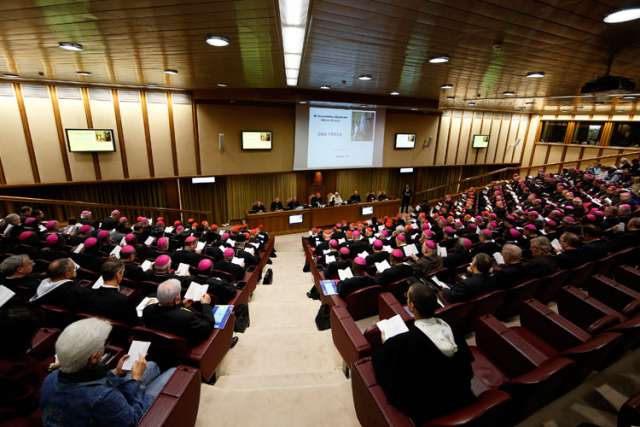The Synod on the family will conclude on Oct. 19 with the beatification of Pope Paul VI. A beatification recognizes the holiness of a Christian disciple, but the elevation to the altar of a pope inevitably includes a lifting up of his pontificate.
In the context of this Synod, the key question will be “which” Paul VI is proposed to the Church. The pope who reinstituted the Synod of bishops, thereby giving a posthumous benediction to whatever this Synod has proposed? Or the pope of Humanae Vitae, the encyclical restating the ancient Christian teaching on the necessity of conjugal acts being open to life?
According to the mainstream media, for which religion is mostly about morality and morality is almost exclusively about sex, Paul VI remains the “Great Exception” to the sexual revolution. Facilitated technologically by the oral contraceptive and culturally by rapid secularization, it successfully separated sex from babies, and in short order, sex from marriage, sex from love, even love from marriage, if love is understood to have a sacrificial, enduring character. Paul VI insisted that both natural law and biblical revelation taught that those things all belonged together — sex, love, marriage and babies. He insisted that, for both human happiness and holiness, what God had joined together, man must not put asunder.
The sexual revolution was the great putting asunder and Paul VI’s predictions about the deterioration of family and social life, especially the degradation of women, now ubiquitous in pornography, have all been proved prophetic. The sexual revolution remains the dominant cultural fact of our time. The Catholic Church, led by Paul VI, refused to be swept along, preferring to remain the lone significant global institution dissenting from the new orthodoxy of sexual libertinism and its offspring of moral relativism. St. John Paul II theologically deepened the Church’s sexual teaching and made it an effective means of evangelization in vibrant sectors of the Church’s pastoral ministry on campus and to young adults.
Yet from 1968 to the present day, for almost 50 years the culture has waited for the day of surrender, when the Catholic Church would finally throw in the towel — or raise the white flag — in the face of a seemingly unstoppable libertine juggernaut. The Church would never baptize the sexual revolution, but it might finally tire of being the Great Exception and then, moved by great exhaustion, the great capitulation would be welcome. The day would surely come, as it had for every other significant Christian community in the West.
It would never happen, countless prelates and commentators responded — it couldn’t happen, for the Church cannot now teach that what was true is now false. It would happen, the culture — from Hollywood to main street — responded. It must happen! The Catholic Church could simply not remain the lone objector to divorce, cohabitation, contraception and the rest of the revolution.
Then came the summer of 2013 and Pope Francis uttered the signature words of his pontificate, “Who am I to judge?” in response to a question about an apparently gay priest. He would remind people later that he was only stating what the catechism teaches, namely that we cannot judge the hearts of others, but in the culture it was received in only one way — the Church, or at least this Pope, was turning the page on the sexual revolution. He would not endorse it, but no longer would he speak against it.
When later that summer he followed up with a warning against being “obsessed” with pro-life issues, the mainstream media — from Time magazine to the gay Advocate — could not contain their joy. They both named him Man of the Year. The long awaited great capitulation had arrived.
Yet for those who don’t take their lead on matters Catholic from the dominant libertine culture, the question remained about what exactly Francis meant, and where exactly the Church was headed. Newspaper interviews do not constitute an exercise of the Church’s magisterium. Hence the great interest in the Synod on the family, both in the Church and the culture at large.
Would the assembly of senior prelates from around the world declare over the course of the Synod this year and the next that the Church has reluctantly, grudgingly, regrettably, but ultimately, made its peace with the sexual revolution? An airborne papal interview cannot raise the white flag of surrender in a decades-long cultural struggle, but a Synod of bishops could feasibly do just that.
That is grave and momentous decision facing the Synod this week. Of course they will not change doctrine, but it is possible to keep doctrine the same and put it safely out of sight. Sexual morality would then follow the Church’s practise on Sabbath observance: No change in doctrine but the teaching that Mass is obligatory on Sunday is simply left unsaid, and the Church simply learns to live with the majority of Catholics ignoring it, and the culture as a whole totally rejecting it.
On Oct. 18 the Synod will vote on its final report. Will the Holy Father beatify on Sunday morning a pope whose most notable teaching was set aside the night before?
(Fr. de Souza is the editor-in-chief of Convivium, a Canadian magazine of faith in our common life: www.conviviummagazine.ca.)


